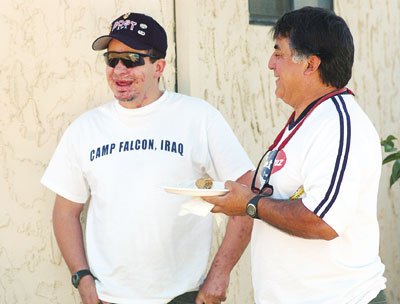There’s hardly anything David Shebib remembers about the
roadside bomb that blasted him off a canal crossing south of
Baghdad and nearly killed him last December.
Morgan Hill – There’s hardly anything David Shebib remembers about the roadside bomb that blasted him off a canal crossing south of Baghdad and nearly killed him last December. All he knows is he wants to rejoin his platoon. But that scenario, just like everything else in his life, is now in doubt.
On Monday, Shebib, 23, began undergoing six weeks of physical and behavioral therapy at the VA Hospital in Palo Alto. After that, he’ll head back to Walter Reed Army Medical Center in Washington, D.C. for reconstructive surgery on his jaw and face.
It’s uncertain if he’ll ever return to his job as an Army medic. It’s uncertain what he’ll do. His parents are worried. But for now, the 2002 graduate of Central High School in Morgan Hill, is summoning all his courage.
“I’ve been injured before,” Shebib said modestly last weekend at a barbecue at his parents’ Morgan Hill home. “This is a little worse, but I’m confident in the care I’m getting.”
Shrapnel from the bomb, which he said was detonated by a cell phone, shattered his jaw, burned his face, broke his collar bone and his right hand, punctured his ear drum, blurred his right eye, weakened his right arm and severed his carotid artery, causing a mild stroke. Weakened by his injuries, he developed pneumonia and an inflamed pancreas, and lost 26 pounds. He was unconscious for three days. When he awoke at Walter Reed, there was only one question on his mind: was his platoon OK?
Now, six months later, it’s unclear if Shebib will rejoin his brothers in arms, who recently learned their stay in Iraq had been extended through early 2008. While lucid and able to walk around – and play volleyball with his friends last Saturday – his speech is slightly altered by his injuries. His responses are delayed. He doesn’t talk about it. But his parents are vocal.
“There’s a lot of grief for what he’s lost,” said Charlene Shebib, David’s mom. “I don’t know what the future holds as far as his injuries.”
Her sadness is evident even as guests buzz around her at the homecoming event for her son, trying to be supportive and show optimism for David’s recovery. She wonders if the American public will recognize David’s sacrifice. More than 26,500 U.S. men and women have been wounded in Iraq, according to the Department of Defense Web site. More than 3,500 have been killed. Meanwhile, more than 70 percent of Americans are unhappy with the direction in which the country is headed. Approval of the war has plunged. Twenty years down the road, will America think the war was “worth it?” she asks.
“I wonder about it,” she said. “A lot of those injured were the strongest, the football heroes, the bravest from their towns. And now they’re so disabled.”
She remembers David, a daredevil who loved extreme sports, wanting to enlist after he finished high school. She said, “No, you’re going to college.” He attended San Jose City College, taking classes to learn how to become a fireman. It didn’t work out. In 2004, he made a life-changing decision. The path to his future would not be through the classroom, but through vocational training. He wanted to be physically fit. He wanted to jump out of airplanes. He wanted to serve his country. He enlisted at a Gilroy recruiting station.
David’s dad, George Shebib, a Vietnam War veteran, praised his son’s decision. But he also expressed bitter feelings for a war he feels America has no business fighting.
“As his dad, I’m proud of what he’s done for his country,” George said. “But I’m very disappointed in how the Bush administration has handled this war. We’ve poked a hornets’ nest. Now we’re trying to put them all back.”
George worries his son may never fully recover from the trauma of his injuries. He senses something has changed.
“It’s probably changed the remainder of my life,” he said. “I’m worried about what his future will be.”
David said “no comment” when asked about his feelings on the war. He described Iraq as disheveled and trash-filled, basically a “third-world” country.
But he painted a dire picture of the military conflict. He said American troops have been drawn into a guerrilla war, facing unknown enemies from all different angles. He acknowledged the situation could be out of control. He said his friends are frustrated about having their tours extended. But above all else, he expressed his regret that he’s sidelined while they continue to struggle, get hurt and even die. As a trained medic, he wants to do his job. But that’s for doctors to decide now.















